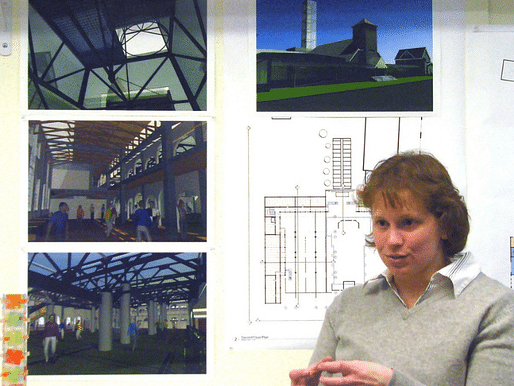
As a young professional with an engineering background, Carolyn Day, M.Arch'08, was attracted to The Boston Architectural College (BAC) because its educational model would support her studies while simultaneously allowing her to take on increasing responsibility at work.
Starting out as a Sustainable Design certificate student, Carolyn naturally took to the project-based curriculum and quickly enrolled in the Master of Architecture program.
“At the BAC, I learned how to pace myself and I learned time management,” the 2022 winner of the AIA Young Architects Award says with conviction. Those lessons have become even more relevant as the new mom juggles parenting responsibilities and a meaningful job as a project manager at Perkins Eastman in Boston.
“As a culture of architects, we really need to be better to ourselves in work-life balance,” she says before admitting, “Yes, I do put in overtime, but I don't put in the crazy time that people might think I do.”
Drawn to architecture “to make a difference in people’s lives” through the built environment, Carolyn champions sustainable design at the global firm.
At the BAC, Carolyn became adept at setting and sticking to her boundaries—enrolling in a maximum of studio plus one class per semester. That course load offered her the bandwidth to develop as a sustainable design specialist at the firm SMMA, where she oversaw LEED certification and Collaborative for High Performance Schools (CHPS) documentation and trained colleagues and clients on best practices in green building.
Though Carolyn’s lower course load meant it took her an extra year to meet the degree requirements at the BAC, the strategy was right for her, and all the hard work paid off. In 2008, on the cusp of a major recession, she had solid job security.
Her thesis project offered practical experience that cross-applied to her future work in the field. Carolyn’s study of “Building as Organism” imagined a community center addition to a local Quincy church. “Creating a tower in the back became a way to circulate air that mimicked the bell tower in the front of the structure,” she explains.

Today, assessing wind energy, natural air flow, energy-efficient lighting, and daylight modeling are all part of Carolyn’s workday at Perkins Eastman. She explains, “Every new building is still using our planet’s shared resources, like energy, but making sure we're doing it in a way that is not detrimental to the planet is a fundamental core value for me.”
As a project manager and part of her firm’s Higher Education/Science and Technology practice, it is part of Carolyn’s responsibilities to put together exceptional teams of employees and consultants with solid sustainability experience.
One team she’s particularly proud of is majority women and minority talent—a rare but aspirational occurrence in a sector that remains dominated by white men. The project, which is still under construction, is the Tobin Montessori/Vassal Lane Upper Schools in the city of Cambridge, Massachusetts, and is an all-electric net zero emissions building, with ground source (geothermal) wells and roof covered in solar panels.
Carolyn’s voice speeds up with excitement as she lays out the background. “Unfortunately, the site was formerly a dump, though it has been the location of a school for decades. We’re remediating it and increasing the green space of the surrounding park. However, the best thing about this project is the team and how we are working together to create a truly sustainable built environment.”
Another meaningful project was the University of Mississippi Duff Center for Science and Technology Innovation, set to open in the fall of 2024. The challenge Carolyn and her team faced and met in Mississippi was envisioning a way for natural light to reach the bottom of a four-story atrium without causing glare or heat issues, which could negatively impact energy use and interfere in the interior experience. They were able to zone the building’s laboratories and teaching spaces so that it had a low Energy Use Intensity “and also offered natural light while allowing the occupants to see the sky and connect to the outdoors.”
For a large lab that was no simple task, but teamwork, again, is what Carolyn attributes to accomplishing these goals.
When she is not behind a drafting table or on a job site, Carolyn acts as an advocate for climate change and other issues that impact architects on the AIA Massachusetts Government Affairs Committee. She was also elected by her peers to represent the Boston Society of Architects on the State’s AIA chapter board.
Look for her at the BAC, deep in conversation with students, where she continues to work as a practice examiner. She tells them to seek out mentors—particularly within the BAC alumni community. “Go for it. Look them up and just reach out. Most successful people are really happy to share the lessons that they have learned—but you have to be the one to initiate the conversation,” she says.
The #BACbuzz blog will help to inform, educate, and share relevant and noteworthy architectural and design news happening within the Boston Architectural College and around the Boston community.
No Comments
Block this user
Are you sure you want to block this user and hide all related comments throughout the site?
Archinect
This is your first comment on Archinect. Your comment will be visible once approved.